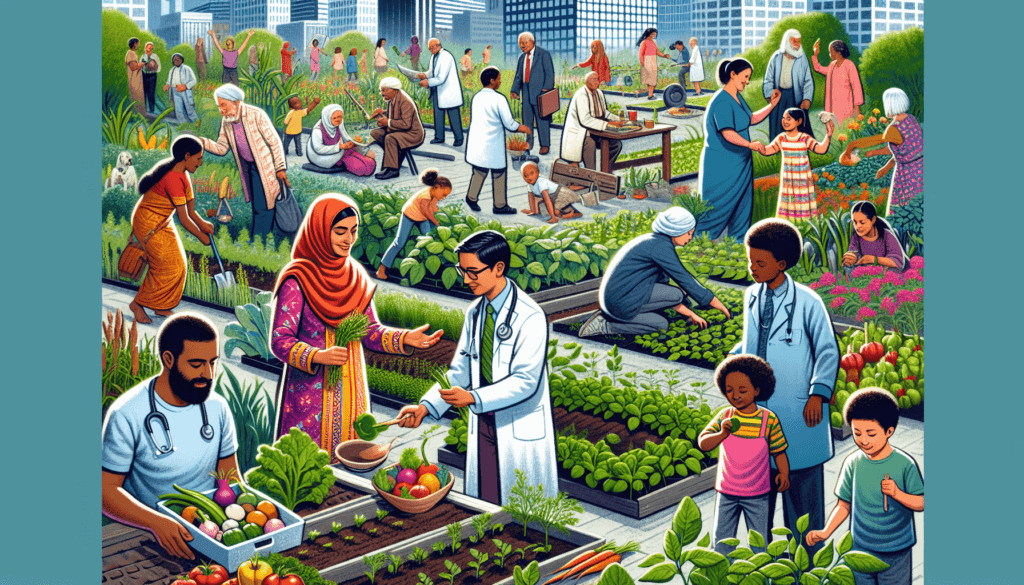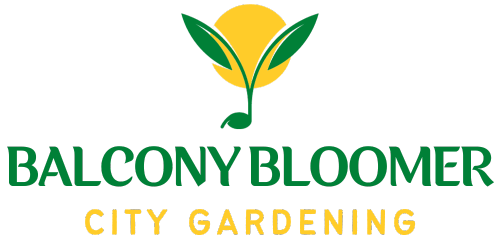Imagine a bustling city, filled with skyscrapers and busy streets. Now envision patches of vibrant green nestled amongst the concrete jungle, where people of all ages and backgrounds gather to tend to these urban oases. This is the intersection of urban gardening and public health, where the benefits of cultivating fresh produce and creating green spaces are not only transforming the physical landscape but also improving the well-being of local communities. By exploring the multifaceted ways in which urban gardening intertwines with public health, we can uncover a world of possibilities for a healthier, greener future.

The Benefits of Urban Gardening
Urban gardening is a rewarding and beneficial practice that offers a multitude of advantages to individuals and communities alike. By cultivating plants in urban areas, you can not only access fresh and nutritious food but also promote physical activity, reduce stress, and enhance social interaction.
Improving Access to Fresh and Nutritious Food
One significant benefit of urban gardening is its ability to improve access to fresh and nutritious food. In many urban areas, access to quality produce can be limited, especially in low-income communities. By growing your own fruits, vegetables, and herbs, you can ensure a constant supply of fresh and healthy produce right at your doorstep. Urban gardening empowers individuals to take control of their food choices, leading to improved nutrition and overall well-being.
Promoting Physical Activity
Incorporating urban gardening into your daily routine provides an excellent opportunity to engage in physical activity. Maintaining a garden requires various tasks, such as planting, watering, weeding, and harvesting, which all involve physical exertion. These activities help burn calories, improve muscle strength and flexibility, and contribute to an overall active lifestyle. Gardening is a great way to stay physically active without even realizing it, making it an enjoyable form of exercise for people of all ages.
Reducing Stress and Improving Mental Health
In today’s fast-paced urban environment, stress has become a common concern for many individuals. Engaging in urban gardening can serve as a therapeutic escape from daily stressors. Spending time in nature and engaging in garden-related activities has been proven to reduce stress levels, lower anxiety, and improve overall mental health. Gardening provides a sense of calmness and connection with the natural world, allowing you to unwind and rejuvenate.
Enhancing Social Interaction
Urban gardening also plays a vital role in fostering social interaction and building a sense of community. Community gardens, in particular, bring individuals together with a shared passion for gardening and sustainable living. These spaces serve as meeting points for neighbors, allowing them to bond, share knowledge and experiences, and work collaboratively towards a common goal. Urban gardening can create meaningful connections and friendships, fostering a sense of belonging and well-being within the community.
Challenges of Urban Gardening
While urban gardening offers numerous benefits, it is important to acknowledge the challenges that come with it. These challenges include limited space and land availability, environmental pollution, lack of knowledge and skills, and the need for community engagement and support.
Limited Space and Land Availability
Urban areas are known for their limited space, making it a challenge to find suitable areas for gardening. Many urban dwellings lack yards or green spaces, forcing individuals to get creative with their gardening techniques. However, even with limited space, urban gardeners have found innovative ways to maximize their growing potential through vertical gardening, rooftop gardening, and balcony gardens.
Environmental Pollution
Urban environments often suffer from high levels of pollution, which can negatively impact plant growth and health. Air pollution, soil contamination, and water pollution can all pose challenges to urban gardening. However, implementing sustainable gardening practices, such as using organic fertilizers, practicing crop rotation, and utilizing proper irrigation techniques, can help mitigate the effects of pollution on plants and promote a healthier urban gardening environment.
Lack of Knowledge and Skills
For many people, urban gardening may be a new venture, and acquiring the necessary knowledge and skills can be a hurdle. Understanding the basics of soil composition, plant care, and pest management is crucial for successful gardening. However, various resources such as gardening classes, online forums, and community workshops are available to help individuals develop the necessary expertise. With the right guidance and support, anyone can become an urban gardener and reap the associated benefits.
Community Engagement and Support
Building a strong network of like-minded individuals and garnering community support is essential for the success of urban gardening initiatives. Establishing community gardens and engaging local residents in gardening activities require collaboration and support. By involving schools, neighborhood associations, and local authorities, urban gardeners can create a sense of ownership and foster sustainable gardening practices that benefit the entire community.
Urban Gardening Models
There are different models of urban gardening that individuals and communities can adopt based on their available resources and preferences. Some popular urban gardening models include community gardens, rooftop and balcony gardens, and vertical gardens.
Community Gardens
Community gardens are collaborative spaces where individuals or groups share gardening responsibilities and cultivate plants collectively. These gardens can be located on public or private lands and serve as gathering places for community members. By sharing resources, knowledge, and skills, community gardens strengthen social ties and promote sustainable urban gardening practices.
Rooftop and Balcony Gardens
Rooftop and balcony gardens are ideal options for individuals with limited ground space. Utilizing rooftops and balconies as gardening areas maximizes the available space and allows urban dwellers to grow a variety of plants. These gardens provide opportunities for individuals to enjoy gardening and access fresh produce without requiring a separate plot of land.
Vertical Gardens
Vertical gardens involve growing plants vertically, often using structures such as trellises, walls, or specialized containers. This method is particularly useful in urban environments where horizontal space is limited. Vertical gardens not only maximize growing space but also lend aesthetic appeal to urban landscapes. They can be incorporated into buildings, fences, and even interior spaces, bringing greenery and freshness to otherwise unused areas.
Urban Gardens and Food Security
Urban gardening plays a significant role in addressing food security challenges, particularly in food deserts and low-income communities. By increasing the availability of fresh and nutritious food, urban gardens contribute to ensuring that everyone has access to a diverse range of quality produce.
Addressing Food Deserts
Food deserts are areas, typically found in low-income urban neighborhoods, where residents lack access to affordable and nutritious food. Urban gardens can bridge the gap by providing local, organic options for fresh produce. By establishing community gardens or supporting urban farming initiatives, communities can take control of their food sources and address the issue of food deserts effectively.
Improving Food Security in Low-Income Communities
Low-income communities often face significant challenges in accessing adequate and nutritious food. Urban gardens offer a sustainable solution to these challenges by empowering individuals within these communities to grow their own food. By cultivating gardens in vacant lots, rooftops, or other available spaces, urban residents can enhance their food security, reduce dependency on expensive grocery stores, and improve the overall health and well-being of their communities.

Urban Gardens and Chronic Diseases
The prevalence of chronic diseases such as obesity, diabetes, high blood pressure, and cardiovascular issues has reached alarming levels in urban settings. Urban gardening can play a crucial role in preventing and managing these diseases by promoting healthy eating habits and active lifestyles.
Prevention of Obesity and Diabetes
Urban gardening encourages individuals to consume more fruits and vegetables, which are essential for maintaining a healthy weight and preventing obesity. By growing their own produce, individuals have easy access to fresh, organic options, reducing their reliance on processed and unhealthy foods. Additionally, the physical activity involved in gardening can further contribute to weight management and diabetes prevention.
Lowering Blood Pressure and Cholesterol
Engaging in regular physical activity, such as gardening, has been proven to lower blood pressure levels and improve cholesterol profiles. The combination of physical exertion, fresh air, and stress reduction through gardening can significantly impact cardiovascular health. By incorporating urban gardening into daily routines, individuals can take proactive steps towards reducing their risk of heart disease and maintaining optimal overall health.
Enhancing Heart Health
Urban gardening not only helps prevent chronic diseases but also enhances heart health. Physical activity involved in gardening improves cardiovascular endurance and stimulates blood circulation. Spending time outdoors, surrounded by nature, further contributes to stress reduction and overall well-being. Tending to your garden can be a heart-healthy activity that nourishes not only your plants but also your own health.
Urban Gardens and Mental Health
The therapeutic benefits of urban gardening on mental health are widely recognized. Gardening provides an avenue for relaxation, mindfulness, and improved psychological well-being.
Therapeutic Effects of Gardening
Engaging in gardening activities has a therapeutic effect on mental health. Working with plants, nurturing their growth, and witnessing the fruits of your labor can be incredibly rewarding. Gardening provides a sense of purpose, accomplishment, and connection with nature, promoting a positive mental state.
Reducing Depression and Anxiety
The act of gardening has been shown to reduce symptoms of depression and anxiety. Spending time in a garden environment can alleviate stress, boost mood, and increase feelings of happiness. The physical activity involved in maintaining a garden also releases endorphins, creating a natural high and reducing symptoms of depression and anxiety.
Promoting Mindfulness and Well-being
Urban gardening promotes mindfulness, a state of heightened awareness and attentiveness to the present moment. Engaging in gardening activities allows individuals to fully immerse themselves in the process, focusing on the task at hand and detaching from external stressors. This meditative quality of gardening promotes a sense of calmness, self-reflection, and overall well-being.

Urban Gardens and Air Quality
Urban areas often suffer from poor air quality due to pollution from various sources. Urban gardening can contribute to improving air quality by acting as a natural filter and reducing the urban heat island effect.
Filtering Air Pollution
Plants have the remarkable ability to filter pollutants from the air, improving overall air quality. By growing a diverse range of plants in urban gardens, individuals can help mitigate the effects of air pollution. Plants absorb carbon dioxide, release oxygen, and filter harmful pollutants, such as volatile organic compounds and particulate matter, from the air.
Reducing Urban Heat Island Effect
Urban areas tend to have higher temperatures compared to surrounding rural areas, a phenomenon known as the urban heat island effect. The abundance of heat-absorbing surfaces, such as concrete and asphalt, contributes to this effect. However, incorporating urban green spaces, including gardens, can help counteract this heat island effect. Plants provide shade, reduce surface temperatures, and cool the surrounding environment through the process of evapotranspiration.
Improving Indoor Air Quality
Indoor air quality is a growing concern, particularly in urban settings where buildings are often tightly sealed. Urban gardening, even on a small scale, can contribute to improving indoor air quality. Indoor plants act as natural air purifiers, removing toxins and pollutants commonly found in indoor environments. By keeping potted plants indoors, individuals can enhance the air quality in their homes and offices.
Urban Gardens and Water Management
Effective water management is crucial in urban gardening to promote sustainability and conserve this vital resource. Urban gardens can utilize innovative techniques to harvest rainwater, mitigate urban flooding, and improve water quality.
Rainwater Harvesting and Conservation
Urban gardens can make use of rainwater harvesting techniques to conserve water and reduce reliance on municipal sources. Collecting rainwater in barrels or tanks allows gardeners to utilize this natural resource for watering plants during dry periods. Rainwater harvesting not only conserves water but also helps minimize stormwater runoff, reducing the strain on urban drainage systems.
Mitigating Urban Flooding
Urban gardening can play a role in mitigating urban flooding by absorbing excess rainwater. Well-designed gardens, with proper soil composition and drainage systems, can act as natural sponges, reducing the volume and intensity of stormwater runoff. This can help alleviate the strain on urban infrastructure during heavy rainfall events and contribute to a more sustainable water management system.
Water Quality Improvement
Urban gardening practices, such as using organic fertilizers and avoiding chemical pesticides, can also contribute to water quality improvement. By minimizing the use of harmful chemicals, urban gardeners prevent the leaching of pollutants into water bodies, such as rivers or groundwater. Sustainable water management in urban gardens ensures that water resources remain clean and safe for both humans and the environment.

Urban Gardens and Environmental Sustainability
Urban gardening is a catalyst for environmental sustainability, enabling individuals and communities to actively contribute to biodiversity conservation, climate change mitigation, and reduction of food waste.
Promoting Biodiversity
Urban areas often lack green spaces and biodiversity, leading to a loss of wildlife and ecological imbalance. By creating urban gardens, individuals can provide habitats for a wide range of plants and animals. Gardens attract pollinators, such as bees and butterflies, essential for plant reproduction and the overall health of ecosystems. Urban gardens serve as biodiversity hotspots, fostering a harmonious coexistence between humans and nature.
Mitigating Climate Change
Urban gardening contributes to mitigating climate change by reducing greenhouse gas emissions and sequestering carbon dioxide from the atmosphere. Plants absorb carbon dioxide during photosynthesis, acting as carbon sinks. By incorporating more vegetation into urban areas through gardening, individuals can help offset carbon emissions and reduce the impact of climate change.
Reducing Food Waste
Food waste is a significant issue globally, with a substantial portion of food ending up in landfills. Urban gardening allows individuals to grow their own food, reducing reliance on store-bought produce and minimizing food waste. By harvesting only what is needed, urban gardeners can practice mindful consumption and contribute to a more sustainable food system.
Urban Gardening Policies and Initiatives
Governments, non-profit organizations, and public health agencies play a crucial role in promoting and supporting urban gardening initiatives. Sustainable gardening practices can be encouraged through supportive legislation, government initiatives, and collaborations with public health agencies.
Supportive Legislation and Regulations
Legislation that supports urban gardening can have a substantial impact on promoting its adoption. Governments can create incentives, tax breaks, or exemptions for urban gardeners, encouraging the conversion of unused urban spaces into green areas. Additionally, regulations can be put in place to ensure the safe and sustainable practice of urban gardening, such as guidelines for organic gardening, water conservation, and waste management.
Government and Non-Profit Initiatives
Governments and non-profit organizations play a vital role in supporting and funding urban gardening initiatives. These entities can provide funding, resources, and technical assistance to individuals and communities interested in starting their own gardens. Local authorities can establish community gardens and provide tools, seeds, and educational programs to ensure the success and sustainability of these initiatives.
Collaboration with Public Health Agencies
Collaboration with public health agencies can facilitate the integration of urban gardening into public health programs. Public health agencies can promote the health benefits of gardening, provide educational resources, and offer training sessions to individuals and communities. By partnering with public health agencies, urban gardeners can leverage existing networks and resources, effectively reaching a wider audience and maximizing the impact of their initiatives.
In conclusion, urban gardening offers numerous benefits that positively impact public health and the environment. By improving access to fresh food, promoting physical activity, reducing stress, enhancing social interaction, and addressing various public health challenges, urban gardening is a powerful tool for creating healthier, more sustainable communities. Through collaboration, support, and the adoption of sustainable practices, urban gardening can continue to flourish and benefit individuals, communities, and the planet as a whole.



